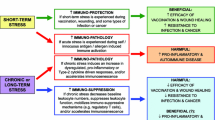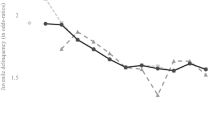Abstract
Background
While early-life exposure to stress has been associated with subsequent psychiatric and cardiovascular morbidity, little is known regarding its potential role in cancer development. We hypothesized that severe emotional stress, such as the loss of a parent through death during childhood, may increase the risk of cancer in early life.
Method
Based on the Swedish Multi-Generation Register, we identified a cohort of 4,219,691 individuals who had both parents identifiable in the same register and followed the cohort from birth to the age of 40 years between 1961 and 2006. Through information retrieved from the Swedish Causes of Death and Cancer Registers, we ascertained death among the parents and cancer diagnosis among the cohort individuals. We used Poisson regression to calculate the relative risks (RRs) and 95 % confidence intervals (CIs).
Results
Parental death was not associated with total cancer risk. However, parental death during childhood was associated with a higher risk of human papillomavirus (HPV) infection-related cancers (RR 1.4; 95 % CI 1.2–1.7), and loss during early adulthood (>18 years) entailed a higher risk of cancers of the stomach (RR 1.8; 95 % CI 1.3–2.6), lung (RR 1.7; 95 % CI 1.1–2.4), rectum (RR 1.4; 95 % CI 1.0–2.0), and breast (RR 1.1; 95 % CI 1.0–1.3). A significant association was observed for pancreatic cancer for both loss during childhood (RR 2.6; 95 % CI 1.6–4.2) and afterward (RR 2.8; 95 % CI 1.9–4.3).
Conclusion
Our results suggest that severe psychological stress in early life may be associated with premature development of certain malignancies, particularly cancers related to smoking and HPV infection.

Similar content being viewed by others
References
Garssen B (2004) Psychological factors and cancer development: evidence after 30 years of research. Clin Psychol Rev 24(3):315–338. doi:10.1016/j.cpr.2004.01.002
McGee R (1999) Does stress cause cancer? There’s no good evidence of a relation between stressful events and cancer. BMJ 319(7216):1015–1016
Cassileth BR (1996) Stress and the development of breast cancer: a persistent and popular link despite contrary evidence. Cancer 77(6):1015–1016
Petticrew M, Fraser JM, Regan MF (1999) Adverse life-events and risk of breast cancer: a meta-analysis. Br J Health Psychol 4:1–17. doi:10.1348/135910799168434
Duijts SF, Zeegers MP, Borne BV (2003) The association between stressful life events and breast cancer risk: a meta-analysis. Int J Cancer 107(6):1023–1029. doi:10.1002/ijc.11504
Ross K (2008) Mapping pathways from stress to cancer progression. J Natl Cancer Inst 100 (13):914–915, 917. doi:10.1093/jnci/djn229
Lutgendorf SK, Sood AK, Anderson B, McGinn S, Maiseri H, Dao M, Sorosky JI, De Geest K, Ritchie J, Lubaroff DM (2005) Social support, psychological distress, and natural killer cell activity in ovarian cancer. J Clin Oncol 23(28):7105–7113. doi:10.1200/jco.2005.10.015
Costanzo ES, Sood AK, Lutgendorf SK (2011) Biobehavioral influences on cancer progression. Immunol Allergy Clin North Am 31(1):109–132. doi:10.1016/j.iac.2010.09.001
Hermes GL, Delgado B, Tretiakova M, Cavigelli SA, Krausz T, Conzen SD, McClintock MK (2009) Social isolation dysregulates endocrine and behavioral stress while increasing malignant burden of spontaneous mammary tumors. Proc Natl Acad Sci USA 106(52):22393–22398. doi:10.1073/pnas.0910753106
McLaughlin KA, Conron KJ, Koenen KC, Gilman SE (2010) Childhood adversity, adult stressful life events, and risk of past-year psychiatric disorder: a test of the stress sensitization hypothesis in a population-based sample of adults. Psychol Med 40(10):1647–1658. doi:10.1017/s0033291709992121
Stein DJ, Scott K, Haro Abad JM, Aguilar-Gaxiola S, Alonso J, Angermeyer M, Demytteneare K, de Girolamo G, Iwata N, Posada-Villa J, Kovess V, Lara C, Ormel J, Kessler RC, Von Korff M (2010) Early childhood adversity and later hypertension: data from the World Mental Health Survey. Ann Clin Psychiatry 22(1):19–28
Momen NC, Olsen J, Gissler M, Cnattingius S, Li J (2013) Early life bereavement and childhood cancer: a nationwide follow-up study in two countries. BMJ Open 3 (5). doi:10.1136/bmjopen-2013-002864
Li J, Vestergaard M, Obel C, Cnattingus S, Gissler M, Ahrensberg J, Olsen J (2012) Antenatal maternal bereavement and childhood cancer in the offspring: a population-based cohort study in 6 million children. Br J Cancer 107(3):544–548. doi:10.1038/bjc.2012.288
Fang F, Fall K, Sparen P, Adami HO, Valdimarsdottir HB, Lambe M, Valdimarsdottir U (2011) Risk of infection-related cancers after the loss of a child: a follow-up study in Sweden. Cancer Res 71(1):116–122. doi:10.1158/0008-5472.can-10-0470
Barlow L, Westergren K, Holmberg L, Talback M (2009) The completeness of the Swedish Cancer Register: a sample survey for year 1998. Acta Oncol 48(1):27–33. doi:10.1080/02841860802247664
Grulich AE, Jin F, Conway EL, Stein AN, Hocking J (2010) Cancers attributable to human papillomavirus infection. Sex Health 7(3):244–252. doi:10.1071/sh10020
Anda RF, Williamson DF, Escobedo LG, Mast EE, Giovino GA, Remington PL (1990) Depression and the dynamics of smoking. A national perspective. JAMA 264(12):1541–1545
Li J, Johansen C, Hansen D, Olsen J (2002) Cancer incidence in parents who lost a child: a nationwide study in Denmark. Cancer 95(10):2237–2242. doi:10.1002/cncr.10943
Levav I, Kohn R, Iscovich J, Abramson JH, Tsai WY, Vigdorovich D (2000) Cancer incidence and survival following bereavement. Am J Public Health 90(10):1601–1607
Keinan-Boker L, Vin-Raviv N, Liphshitz I, Linn S, Barchana M (2009) Cancer incidence in Israeli Jewish survivors of World War II. J Natl Cancer Inst 101(21):1489–1500. doi:10.1093/jnci/djp327
Shi M, Du L, Liu D, Qian L, Hu M, Yu M, Yang Z, Zhao M, Chen C, Guo L, Wang L, Song L, Ma Y, Guo N (2012) Glucocorticoid regulation of a novel HPV-E6-p53-miR-145 pathway modulates invasion and therapy resistance of cervical cancer cells. J Pathol 228(2):148–157. doi:10.1002/path.3997
Antoni MH, Lutgendorf SK, Cole SW, Dhabhar FS, Sephton SE, McDonald PG, Stefanek M, Sood AK (2006) The influence of bio-behavioural factors on tumour biology: pathways and mechanisms. Nat Rev Cancer 6(3):240–248. doi:10.1038/nrc1820
Bosch FX, Burchell AN, Schiffman M, Giuliano AR, de Sanjose S, Bruni L, Tortolero-Luna G, Kjaer SK, Munoz N (2008) Epidemiology and natural history of human papillomavirus infections and type-specific implications in cervical neoplasia. Vaccine 26(Suppl 10):K1–16. doi:10.1016/j.vaccine.2008.05.064
Plummer M, Peto J, Franceschi S (2012) Time since first sexual intercourse and the risk of cervical cancer. Int J Cancer 130(11):2638–2644. doi:10.1002/ijc.26250
Dowdney L (2000) Childhood bereavement following parental death. J Child Psychol Psychiatry 41(7):819–830
Brent D, Melhem N, Donohoe MB, Walker M (2009) The incidence and course of depression in bereaved youth 21 months after the loss of a parent to suicide, accident, or sudden natural death. Am J Psychiatry 166(7):786–794. doi:10.1176/appi.ajp.2009.08081244
Hipwell A, Stepp S, Chung T, Durand V, Keenan K (2012) Growth in alcohol use as a developmental predictor of adolescent girls’ sexual risk-taking. Prev Sci 13(2):118–128. doi:10.1007/s11121-011-0260-3
Brookmeyer KA, Henrich CC (2009) Disentangling adolescent pathways of sexual risk taking. J Prim Prev 30(6):677–696. doi:10.1007/s10935-009-0196-6
Wilson K, Asbridge M, Kisely S, Langille D (2010) Associations of risk of depression with sexual risk taking among adolescents in Nova Scotia high schools. Can J Psychiatry 55(9):577–585
Muniz-Cohen M, Melhem NM, Brent DA (2010) Health risk behaviors in parentally bereaved youth. Arch Pediatr Adolesc Med 164(7):621–624. doi:10.1001/archpediatrics.2010.101
Fang CY, Miller SM, Bovbjerg DH, Bergman C, Edelson MI, Rosenblum NG, Bove BA, Godwin AK, Campbell DE, Douglas SD (2008) Perceived stress is associated with impaired T-cell response to HPV16 in women with cervical dysplasia. Ann Behav Med 35(1):87–96. doi:10.1007/s12160-007-9007-6
Raimondi S, Maisonneuve P, Lohr JM, Lowenfels AB (2007) Early onset pancreatic cancer: evidence of a major role for smoking and genetic factors. Cancer Epidemiol Biomarkers Prev 16(9):1894–1897. doi:10.1158/1055-9965.epi-07-0341
Al-Wadei HA, Plummer HK 3rd, Ullah MF, Unger B, Brody JR, Schuller HM (2012) Social stress promotes and gamma-aminobutyric acid inhibits tumor growth in mouse models of non-small cell lung cancer. Cancer Prev Res (Phila) 5(2):189–196. doi:10.1158/1940-6207.capr-11-0177
Schuller HM, Al-Wadei HA, Ullah MF, Plummer HK 3rd (2012) Regulation of pancreatic cancer by neuropsychological stress responses: a novel target for intervention. Carcinogenesis 33(1):191–196. doi:10.1093/carcin/bgr251
Huang J, Valdimarsdottir U, Fall K, Ye W, Fang F (2013) Pancreatic cancer risk after loss of a child: a register-based study in Sweden during 1991–2009. Am J Epidemiol 178(4):582–589. doi:10.1093/aje/kwt045
Acknowledgments
This work was supported by Grants from the Swedish Research Council (K2009-70X-21087-01-2 and SIMSAM 80748301), Alex och Eva Wallströms stiftelse, and The Research Committee in Örebro County Hospital. FF was supported by a postdoctoral Grant from Svenska Sällskapet för Medicinsk Forskning (SSMF).
Author information
Authors and Affiliations
Corresponding author
Additional information
Katja Fall and Fang Fang have contributed equally to this work.
Rights and permissions
About this article
Cite this article
Kennedy, B., Valdimarsdóttir, U., Sundström, K. et al. Loss of a parent and the risk of cancer in early life: a nationwide cohort study. Cancer Causes Control 25, 499–506 (2014). https://doi.org/10.1007/s10552-014-0352-z
Received:
Accepted:
Published:
Issue Date:
DOI: https://doi.org/10.1007/s10552-014-0352-z




